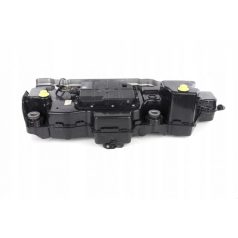Diesel Particulate filter (DPF), FAP, ADblue system parts
The AdBlue tank is a separate part of the vehicle, usually located near the fuel tank. The capacity of the tank depends on the type and construction of the vehicle, but is usually between 10 and 30 liters. The AdBlue system constantly monitors the AdBlue level and the operation of the system. If the AdBlue level is critically low, the on-board computer warns the driver that it needs to be refilled. If the AdBlue level is not refilled, the vehicle's performance gradually decreases, and eventually the system disables the engine from restarting. AdBlue consumption depends largely on the use of the vehicle, but on average, refilling is required every 5,000 to 10,000 kilometers.
The combustion of fossil fuels releases various harmful substances into the atmosphere, including nitrogen oxides (NOx), which can cause serious environmental and health problems. Nitrogen oxides contribute to acid rain, ground-level ozone formation and particulate pollution. These pollutants damage ecosystems, plants and animals alike. They also pose a threat to human health, causing respiratory diseases, asthma and other serious illnesses. They are particularly dangerous for children and the elderly.
The AdBlue system is a component that has made it possible to reduce nitrogen oxide emissions from diesel vehicles by up to 90% compared to the pollution levels of previous models. This is a huge step forward in environmental protection, as road transport is one of the most significant sources of NOx pollution. The spread of AdBlue technology not only reduces local and regional air pollution, but also contributes to the reduction of greenhouse gas emissions on a global scale. Reduced NOx emissions can mitigate the effects of climate change, thus protecting the Earth's ecosystems and biodiversity for future generations.
AdBlue is a 32.5% urea solution that plays an essential role in reducing harmful emissions from diesel vehicles. The system works on the principle of selective catalytic reduction (SCR), which converts harmful nitrogen oxides into nitrogen and water.
The AdBlue system is a component that has made it possible to reduce nitrogen oxide emissions from diesel vehicles by up to 90% compared to the pollution levels of previous models. This is a huge step forward in environmental protection, as road transport is one of the most significant sources of NOx pollution. The spread of AdBlue technology not only reduces local and regional air pollution, but also contributes to the reduction of greenhouse gas emissions on a global scale. Reduced NOx emissions can mitigate the effects of climate change, thus protecting the Earth's ecosystems and biodiversity for future generations.
AdBlue is a 32.5% urea solution that plays an essential role in reducing harmful emissions from diesel vehicles. The system works on the principle of selective catalytic reduction (SCR), which converts harmful nitrogen oxides into nitrogen and water.

